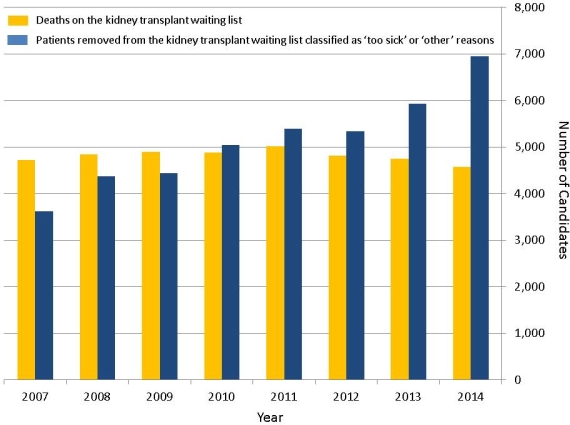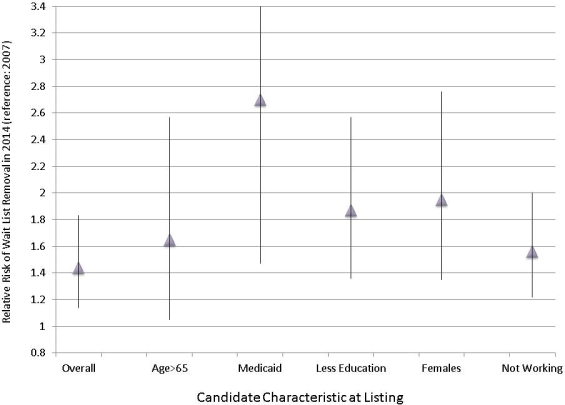Significant Increase in Wait List Removals for Candidates Considered Too Sick from the US Kidney Transplant Waiting List.
Cleveland Clinic, Cleveland, OH.
Meeting: 2016 American Transplant Congress
Abstract number: 511
Keywords: Kidney transplantation, Public policy, Risk factors, Waiting lists
Session Information
Session Name: Concurrent Session: Kidney Waitlist Management and KAS Initial Results
Session Type: Concurrent Session
Date: Tuesday, June 14, 2016
Session Time: 4:30pm-6:00pm
 Presentation Time: 4:42pm-4:54pm
Presentation Time: 4:42pm-4:54pm
Location: Veterans Auditorium
Approximately 59,000 kidney transplant candidates have been removed from the waiting list since 2000 for reasons other than transplantation, death, or transfers. In 2014, reasons for removal included patients classified as 'too sick' (n=3,668) or 'other' reasons (n=3,278) which exceeded the number of living donor transplants. The number of patients removed from the waiting list classified as too sick or 'other' has approximately doubled from 2007-2014, now outpacing deaths on the waiting list.  Using national SRTR data, we examined risk factors for wait list removal following listing in the United States.
Using national SRTR data, we examined risk factors for wait list removal following listing in the United States.
Based on adjusted multivariable Cox models, risk factors for wait list removal included older age, diabetics, Caucasians, longer pre-listing dialysis time, public health insurance, lower educational attainment, candidates initially listed inactively, peripheral and cerebrovascular disease and not working for income. Rates highly varied between individual transplant centers. Relative to candidates listed in 2007, the adjusted hazard for wait list removal in 2014 was significantly elevated (AHR=1.44,95% CI 1.14-1.83). Moreover, this elevated risk has increased disproportionally among candidates that are older, less educated, not working and females. 
Cumulatively, there is a significant change in waitlist management among kidney transplant centers in the US and candidates are more likely to be removed following listing for transplantation. These rates are disproportionately high in some groups which likely express a combination of medical and social risk factors. Further investigation as to the reason for practice changes, determining whether patients removed in recent years are uniformly non-viable candidates and the impact on access to transplantation are warranted.
CITATION INFORMATION: Poggio E, Buccini L, Flechner S, Goldfarb D, Schold J. Significant Increase in Wait List Removals for Candidates Considered Too Sick from the US Kidney Transplant Waiting List. Am J Transplant. 2016;16 (suppl 3).
To cite this abstract in AMA style:
Poggio E, Buccini L, Flechner S, Goldfarb D, Schold J. Significant Increase in Wait List Removals for Candidates Considered Too Sick from the US Kidney Transplant Waiting List. [abstract]. Am J Transplant. 2016; 16 (suppl 3). https://atcmeetingabstracts.com/abstract/significant-increase-in-wait-list-removals-for-candidates-considered-too-sick-from-the-us-kidney-transplant-waiting-list/. Accessed July 12, 2025.« Back to 2016 American Transplant Congress
